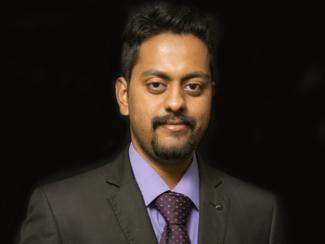
Research Scientist
Vikram Shenoy Handiru, PhD, is a research scientist in the Center for Mobility and Rehabilitation Research and the director of the Neuromuscular and Electrophysiology Laboratory at Kessler Foundation. He joined the Foundation as a postdoctoral research fellow in 2018. Dr. Shenoy Handiru is also affiliated with the Department of Physical Medicine and Rehabilitation at Rutgers New Jersey Medical School as a research assistant professor.
Dr. Shenoy Handiru acquired his Bachelor of Technology degree in Electronics & Communication Engineering from the National Institute of Technology Karnataka, Surathkal (India) and his doctorate in Neural Signal Processing from Nanyang Technological University, Singapore.
Grant Reviewer: NIH sponsored National Center of Neuromodulation for Rehabilitation (NM4R) Pilot grants for FY2023-24 cycle, 2022.
Selected among one of the top 30 mentees to attend a fully sponsored “Training in Grantsmanship for Rehabilitation Research (TIGRR)” workshop in Charleston, SC, 2022.
Certified training of CONN toolbox workshop, Harvard Medical School, Boston, MA, 2019.
IEEE Computational Intelligence Graduate Research Award to pursue research project at Max Planck Institute for Intelligent Systems, Tubingen, Germany, 2016.
IEEE Brain Initiative Student Travel Grant to attend the conference in Budapest, Hungary, 2016.
Best student paper award IEEE Systems, Man, and Cybernetics (SMC) Conference 2014 held in San Diego, CA., 2014.
IEEE SMC 2014 Student Travel Grant to attend the conference in San Diego, CA, 2014.
Dr. Shenoy Handiru’s research aims to understand the neural correlates of neuromuscular disorders and develop targeted therapeutic interventions through novel neuroengineering technologies. As a research scientist at the Center for Mobility and Rehabilitation Engineering Research (CMRER) at Kessler Foundation (KF), Dr. Shenoy Handiru is currently leading several projects focused on the individualized and targeted noninvasive brain stimulation methods combined with sensor-based exergaming for improving hand dexterity in stroke and traumatic brain injury populations.
View a comprehensive listing of Dr. Shenoy Handiru’s publications on Google Scholar.